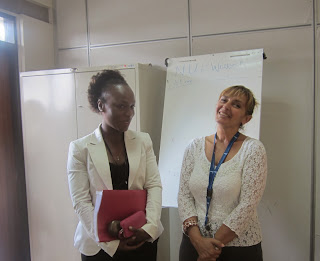By Betty Makelemu Tole
IFAD staff, representatives of other UN agencies, partners, non-governmental organizations, community based, and private sector organizations were on 31 October 2013 united in supporting the case for scaling up impact of successful development interventions through South-South and Triangular Cooperation. These discussions were held on the fourth day of the Global South-South Development (GSSD) Expo taking place in Nairobi, Kenya on 28 October to 1 November 2013, at a Partnership Forum organized and facilitated by IFAD. The forum “South-South Cooperation for Impact at Scale: Towards a Community of Practice and Learning Alliance” was organized with the aim to set the stage for a systematic approach to future dialogue on South-South Cooperation as a special and important case for scaling up.
 |
| Nadine Gbossa, Country Director and Head of Regional Office, Nairobi |
Nadine Gbossa, Country Director and Head of IFAD Regional Office in Nairobi, in her welcoming remarks highlighted the role of scaling up in facing up to the challenge of addressing the high poverty levels in rural areas, and also the value of working together to develop sustainable partnerships.
The thrust of the session was a presentation on scaling up made by Johannes Linn, Senior Fellow at The Brookings Institution in which he provided a definition of scaling up, types and linkages in scaling up and lessons for implementation. He defined scaling up as - “about more impact by improving more people’s lives on a lasting basis… its not about individual projects, but about supporting longer term programmes of engagement and building momentum…” Types of scaling up include: expansion of services to more people in a given geographical area, horizontal, vertical and functional scaling up. Integral to scaling up is identifying the intervention that is being scaled up; having a vision of what a scaled-up intervention might look like; identifying the drivers expected to push the scaling-up process; creating spaces for the initiative to grow such as the financial space, natural/environmental space, policy, political, cultural, partnership and learning spaces; and putting in place pathways that define the movement of the idea/innovation to scaling up as illustrated in the figure below.
 |
| Innovation, learning, and scaling up as an iterative processScaling Up |
During the sharing of institutional experiences on scaling up, H. Kato, JICA highlighted the challenges they have faced in scaling up: dealing with the practitioner’s mindset, and the fear of higher risks presented by scaling up, “the larger the cooperation, the more the risks,” said Kato. Liu Ke of IFAD, China highlighted the need to connect scaling up cases/lessons with regional and global scaling up initiatives (scale the scale up), identifying new partners and opportunities for synergies, and exploring new implementation mechanisms.
Comments from country representatives and partners of IFAD on scaling up
Argentina – spaces need to be expanded especially financial space and the role of the private sector in financing. Scaling up requires human resource development, and social space - we have to focus on projects that maximize on social inclusion.
 |
| Development Partners Following Proceedings |
ICRAF – we need to test multiple pilots and report on failure; otherwise we end up having fraud.
UNDP – UNDP acts as a knowledge broker, focusing on identifying scalable south solutions that are fully analyzed and demonstrated to have impact on people’s lives. The knowledge includes contractual knowledge and knowledge about pathways.
World Bank – promotes knowledge hubs as an approach for scaling up. They have established a community of practice on knowledge hubs focusing on how to transform organizations, engage in strategic partnerships and how to document results.
FAO – South-South Cooperation is not an end to itself but a means to an end. There is need for uptake of development solutions, strengthening of knowledge networks and fostering an enabling environment for South-South Cooperation.
UNEP – Always keep in mind that ecosystems play a role in ensuring effectiveness of scaling up to achieve long term sustainability.
 |
| Participants following the Scaling Up Discussions |
UN-HABITAT – To scale up, we have to balance between long-term development solutions and short term immediate needs of the citizens.
Private sector organization in Kenya – we need to think the unthinkable and do the undoable. Scale up should be driven by entrepreneurship and making profit.
Climate Change Knowledge Network – scaling up needs champions, people to should out for you.
Mr. Cheikh Sourang, Senior Programme Manager and Focal Point, South-South and Triangular Cooperation at IFAD, facilitated the forum. Mr. Yiping Zhou, the Director, UN Office for South-South Cooperation also participated in the forum.
The GSSD Expo 2013 draws to a close on Friday, 1st November 2013.